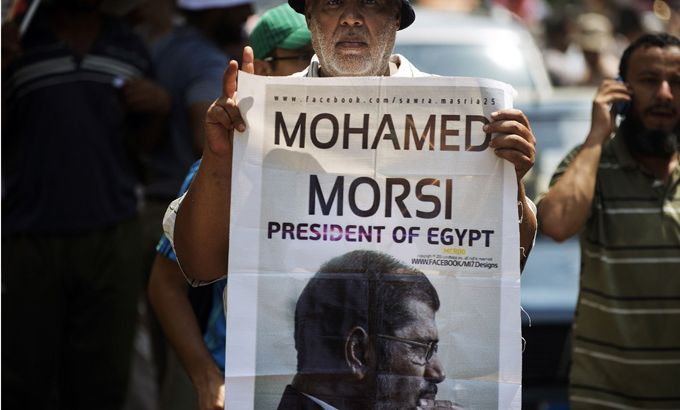Rights group says Egypt detainees beaten
Amnesty International says detained supporters of deposed President Morsi have been beaten and denied access to lawyers.

Hundreds of Mohamed Morsi supporters arrested in Egypt have been beaten in custody, according to Amnesty International.
In a report leaked on Thursday, the human rights organisation says more than 660 supporters of deposed President Mohamad Morsi have been held since he was removed from power three weeks ago, with many of the detained being Muslim Brotherhood leaders.
According to Amnesty International, some detainees that have been released say they were blindfolded, beaten, hit with rifle butts and subjected to electric shocks.
Many of the detainees, says the rights group, were not given access to a lawyer.
Al Jazeera’s Rawya Rageh, reporting from Cairo, says that while the Egyptian police do not have a “brilliant track record of processing detainees,” it remains “difficult to ascertain the nature of treatment that these detainees received once they are inside the station or are in custody.”
“It’s difficult to independently verify the contents of the report, primarily because it’s entirely dependent on the testimonies of the detainees themselves,” added our correspondent.
However, the nature of the arrests themselves, many of which took place during running street battles, were witnessed by many, and were “heavy-handed”, leaving the impression that supporters of the deposed president were being targeted.
Meanwhile, Morsi’s supporters continue to rally across the country and continue their vigil in the Naser City area of Cairo.
The Muslim Brotherhood said on Thursday it had proposed through an EU go-between a framework for talks to resolve Egypt’s political crisis, its first formal announcement of an offer for negotiations since Morsi was toppled.
Brotherhood official Gehad el-Haddad, who represented the movement in previous EU-facilitated talks, told Reuters the proposal had been made to envoy Bernardino Leon before a visit on Wednesday by EU foreign affairs chief Catherine Ashton.
Earlier the Brotherhood expressed disappointment that the EU had not condemned the military coup against Morsi.
In the run-up to the coup, millions took to the streets accusing Morsi of concentrating power in the hands of the Muslim Brotherhood during his year in office, of sending the economy into free fall and of failing to protect minorities.
The political upheaval in the wake of Morsi’s toppling on July 3 inflamed tensions in the Arab world’s most populous nation, with near daily protests by Morsi loyalists in the capital, where thousands of Islamists remained camped out at the Rabaa al-Adawiya mosque in Cairo’s Nasr City.
More demonstrations are expected on Friday after the weekly Muslim prayers.
Egypt has been rocked by violence since the coup, with 53 people killed last week, most of them Morsi supporters, when clashes erupted between Islamist protesters and the security forces outside a military barracks in Cairo.
The restive Sinai peninsula has been hit by a surge of deadly attacks, with militants killing three policeman in separate attacks on Wednesday night in the northern towns of El-Arish and Sheikh Zuweid.
Analysts attribute the Sinai violence, in which several security personnel, two Egyptian Christians and three factory workers have also been killed, to Islamist extremists seeking to take advantage of the political insecurity in Egypt.